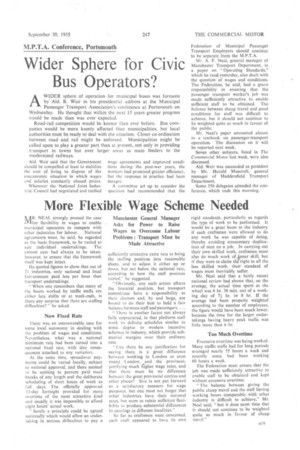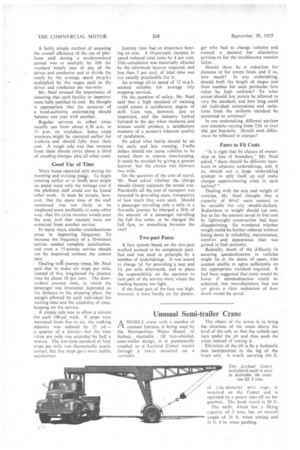More Flexible Wage Scheme Needed
Page 53

Page 54

If you've noticed an error in this article please click here to report it so we can fix it.
UR. NEAL strongly pressed the case alfor flexibility in wages to enable municipal operators to compete with
other industries for labour. National agreements must, he said, be regarded as the basic framework, to be varied to suit individual undertakings. The utmost care had always to be taken, however, to ensure that the framework itself was kept intact.
He quoted figures to show that out of 2i industries, only national and local Government paid less per hour than transport undertakings.
"When one remembers that many of the hours worked by traffic staffs arc either late shifts or at week-ends, is there any surprise that there are staffing difficulties? " he asked.
Now Fixed Rate
There was an unanswerable case for some local autonomy in dealing with the problem of wages and conditions. Nevertheless, what was a national minimum rate had been turned into a national fixed rate, with dire consequences attached to any variation.
At the same time, spreadover payments could be varied locally, subject to national approval, and there seemed to be nothing to prevent paid meal breaks of any length and the deliberate scheduling of short hours of work as full .days. The officially approved 11-day fortnight provided for more overtime of the most attractive kind and usually it was impossible to afford eight hours' actual work.
Surely a principle could be agreed nationally which would allow an undertaking in serious difficulties to pay a
sufficiently attractive extra rate to bring the staffing position into reasonable shape. and to adjust it either up or down, but not below the national rate, according to how the staff position varied,he suggested.
"Obviously, any such action affects the financial position, but transport committees have a responsibility to their electors and, by and large, are bound to do their best to hold a fair balance between staff and passengers....
There is another factor not always fully appreciated, in that platform staff work to definite schedules similar in some degree to modern incentive schemes irt industry, which provide substantial margins over their ordinary rate.
Can there be any justification for saying there is a great difference between working in London or even round London, and the provinces, justifying much higher wage rates, and that there must be no difference between the great provincial centres and other places? Size is not put forward as a satisfactory measure for wage purposes, but one must not forget that other industries have their national rates, but seem to retain sufficient flexibility to produce substantial differences in earnings in different localities."
So far as craftsmen were concerned, each craft appeared to have its own
rigid standards, particularly as regards the type of work to be performed. It would be a great boon to the industry if each craftsman were allowed to do any work he was capable of doing, thereby avoiding unnecessary duplication of men on a job. In carrying out their own skilled work, craftsmen must also do much work of4esser skill, but if they were to claim thrright to all the less skilled work, their standard of wages must inevitably suffer.
Mr. Neal said that a fairly recent national review had shown that, on the average, the actual time spent at the wheel was 6 hr. 38 mm. out of a working day of 7i hr. or 8 hr. If the average had been properly weighted according to the number of employees, the figure would have been much lower, because the time for the larger undertakings having heavy peak traffic was little more than 6 hr.
Too Much Overtime
Excessive overtime was being worked. Many traffic staffs had for long periods averaged nearly 55 hours a week and recently some had been working 60 hours a week.
The Federation must ensure that the job was made sufficiently attractive to enable staff to be obtained and kept without excessive overtime.
"The balance between giving the public cheap travel and the staff having working hours comparable with other industry is difficult to achieve," Mr. Neal said, " but it does seem time that it should not continue to be weighted quite so much in favour of cheap travel." A fairly simple method of assessing the overall efficiency of the use of platform staff during a predetermined period was to multiply by 100 the standard hourly rate of pay of the driver and conductor and to divide the result by the average speed (m.p.h.) multiplied by the wages paid to the driver and conductor per bus-mile.
Mr. Neal stressed the importance of ensuring that each facility or improvement fully justified its cost. He thought it appropriate that the accounts of a local-authority undertaking should balance one year with another.
Regular services in urban areas usually ran from about 6.30 a.m. to 11 p.m. on weekdays. Some extra journeys might be operated earlier for workers and should fully, meet their cost. A rough rule was that revenue from them should cover about a third of standing charges, plus all other costs.
Good Use of Time
Many buses operated only during the morning and evening peaks. To begin running earlier or to finish later might on paper incur only the mileage cost if the platform staff could not be found other work. It must be certain, however, that the spare time of the staff concerned was not• likely to be employed more profitably in some other way; 'that the extra revenue would meet the cost, and that receipts were not extracted from another service.
In many ways, similar considerations arose in improving frequency. To increase the frequency of a 10-minute service needed complete justification, and even a 15-minute service should not be improved without the utmost care. Dealing witt journey times, Mr. Neal said that to make six stops per mile, instead of five, lengthened the journey time by about 10 per cent. The doorto-door journey time, in which the passenger was interested, depended on the distance to the stopping place, the margin allowed by each individual for waiting time and the reliability of timekeeping on the service. A simple rule was to allow a minute for each 100-yd. walk. If stops were increased from five to six, the walking distance was reduced by 25 yd.— a quarter of a minute--but the time taken per mile was extended by half a minute. The war-time standard of four stops per mile was theoretically nearly correct, but five stops gave more public satisfaction, Journey time had an important bearing on cost. A 10-per-cent, increase in speed reduced total costs by 4 per cent. This calculation was materially affected by the minimum layover required, and less than 5 per cent. of total time was not usually practicable for it.
An average all-in speed of 12 m.p.h. seemed suitable for average city stopping services.
On the question of safety, Mr. Neal said that a high standard of training could ensure a satisfactory degree of skill. Care was, however, just as important, and the industry looked forward to the day when medicine and science could produce a satisfactory measure of a person's inherent quality of carefulness.
Re asked what limits should be set for early and late running. Traffic delays should not cause vehicles to be turned short to restore time-keeping. It could be avoided by giving a greater layover, but the choice was between two evils.
On the question of the cost of travel. Mr. Neal asked whether the charge should closely represent the actual cost. Practically all the cost of transport was incurred in providing seats, irrespective of how much they were used. Should a passenger travelling only a mile in a five-mile journey be charged a fifth of the amount of a passenger travelling the full five miles, or be charged the full fare, or something between the two?
Two-part Fares A fare system based on the two-part method seemed to be completely justified and was used in principle by a number of undertakings. It was sound to charge Id. for providing a seat and 1d per mile afterwards, and to place the responsibility on the operator to turn part of the service short where the loading became too light.
If the fixed part of the fare was high, however, it bore hardly on the passen ger who had to change vehicles and created a demand for alternative services or for the troublesome transfer ticket.
Should there be a reduction for distance or for return fares, and if so, how much? In any undertaking, should both the length of stages and their number for each particular fare value be kept uniform? To what extent should key points be allowed to vary the standard, and how long could old individual concessions and variations from the uniform standard be permitted to continue?
In one undertaking, different services Cost amounts varying from 23d. to over 40d. per bus-mile. Should such differences be reflected in charges?
Fares to Fit Costs 'Is it right that by chance of ownership or line of boundary," Mr. Neal asked, "there should be different treatment in adjacent undertakings, and, if so, should not a large undertaking attempt to split itself up and make charges approximating costs in each section?"
Dealing with the size and weight of vehicles, Mr. Neal thought that a capacity of 60-62 seats seemed to be suitable for city double-deckers. Reductions in weight should cut cost, but so far the amount saved in first cost by lightweight construction had been disappointing. Ile wondered whether weight could be further reduced without losing more in reliability, maintenance, comfort and appearance than was gained in fuel economy.
Basically, much of the difficulty in securing slandardization in vehicles might lie at the doors of users, who seemed unable to agree sufficiently on the appropriate standard required. It had been suggested that costs would be lower if standardization could be achieved, but manufacturers had not ye+ given a clear indication of how much would be saved.




























































































